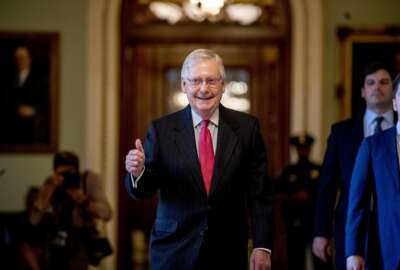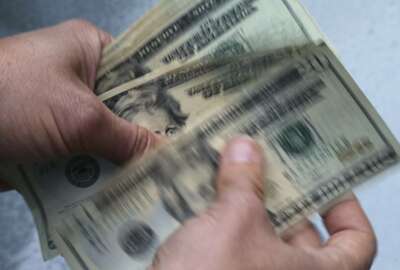
Your checks during coronavirus: A guide for federal employees and retirees
Most Social Security benefits and retirement checks will come as planned. And federal retirees who receive Social Security benefits won't need to file separate...
Even during a global pandemic, most Social Security and annuitant checks will come as planned, and the vast majority of federal employees and retirees won’t need to do much to receive upcoming coronavirus stimulus payments.
Federal News Network has received many questions from readers about the status of the retirement and Social Security checks, as well as the stimulus checks included in the $2 trillion Coronavirus Aid, Relief and Economic Security (CARES) Act, which the president signed into law last week.
Both the Social Security Administration and the Office of Personnel Management have said checks will continue to go out on time.
“Annuitants will continue to receive their checks and there has been no disruption of retirement services,” Anthony Marucci, an OPM spokesman, said last week in a statement to Federal News Network.
SSA’s field offices are closed to the public but are still taking questions by phone and its website, though wait times on the National 800 number may be long, the agency acknowledged.
“Social Security will pay monthly benefits on time and these payments will not be affected by the COVID-19 pandemic,” SSA Commissioner Andrew Saul said this week in a statement. “I want our beneficiaries to be aware that scammers may try to trick you into thinking the pandemic is stopping or somehow changing your Social Security payments, but that is not true. Don’t be fooled.”
Many federal annuitants likely have their OPM or Social Security payments delivered to them automatically through direct deposit, said Greg Klingler, director of wealth management for the Government Employees Benefits Association.
GEBA is a non-profit benefits association for federal employees, primarily those in the military, defense and intelligence communities.
“In the short term, I don’t see any issues with the checks coming out,” Klingler said in an interview. “For those people who are already in the system and it’s already moving forward, we don’t foresee any issues with the checks being stopped because it’s such an automated process.”
Klingler said some of his members have filed their retirement paperwork early, anticipating potential future delays in processing their claims when the time comes to leave federal service.
What about those coronavirus stimulus checks?
The Treasury Department and the IRS are responsible for sending stimulus checks, not the Social Security Administration or any other agency.
Under the CARES Act, any individual with a gross adjusted income of up to $75,000 or any married couple with a joint income of up to $150,000 will receive a coronavirus stimulus check worth $1,200.
For those with higher incomes, the IRS will cut the payment by $5 for each $100 above the $75,000 personal or $150,000 joint thresholds.
This includes federal retirees, including railroad retirees.
Individuals with incomes higher than $99,000 or married couples with joint incomes exceeding $198,000 are not eligible for a coronavirus stimulus check.
Treasury Secretary Steve Mnuchin has said coronavirus stimulus payments will go out in the next two-to-three weeks, mostly by direct deposit or paper checks.
Using information from 2019 or 2018 tax filings, the IRS said it will calculate and automatically send these payments to eligible individuals.
The agency will deposit coronavirus stimulus payments directly in the same banking account reflected on the most recent tax filing, according to the IRS.
Federal retirees who are receiving Social Security benefits and did not file tax returns in 2018 and 2019 will automatically receive coronavirus stimulus checks, the Treasury Department and the IRS said Wednesday.
Originally, Treasury had said Social Security beneficiaries would have to fill out an abbreviated tax return in order to receive stimulus payments, but the department reversed course.
“The Treasury Department was actually given authorization to grab additional information from places like Social Security to determine eligibility for the stimulus checks,” Klingler said.
The department will instead use information from standard SSA forms to generate the coronavirus stimulus checks for these individuals. They’ll receive payments as a direct deposit or by paper check, just as they would normally receive Social Security benefits, Treasury said.
Now what to do with those coronavirus stimulus checks?
Much of the federal workforce is in a relatively enviable situation. Most are still employed and are perhaps more insulated from the financial hardships impacting the average employee or owner at a small business, restaurant or gig economy worker, Klingler said.
“They’re probably spending less money because they’re not going into the office as much, if at all,” he said of most federal employees. “Dry cleaning goes down, eating out goes down. Their budget will probably reduce during this pandemic.”
Klingler advised federal employees to think about using their stimulus checks as launchpad for planning ahead.
“Is it increased money going into your TSP? Is it paying off your high-interest credit card debt? Those are decisions that the federal employee can make because they’re protected with their salary that’s still coming in,” he said.
Most federal retirees — if they’ve planned properly — will be in a similar situation.
“Your pension is going to continue to come in,” Klingler said. “You can plan to move forward and look for the future. Plan for if you need something in the short-term or the long-term.”
Copyright © 2025 Federal News Network. All rights reserved. This website is not intended for users located within the European Economic Area.
Nicole Ogrysko is a reporter for Federal News Network focusing on the federal workforce and federal pay and benefits.
Follow @nogryskoWFED
Related Stories





